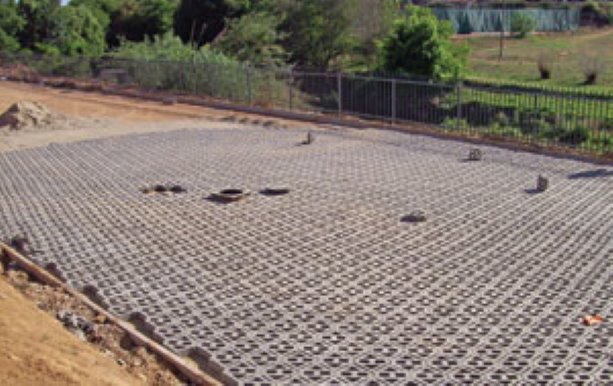The days of slapping concrete and asphalt down to make a paved trail walkway, or driveway may be numbered. Commercial properties, public spaces, and residential developments have upped the standard on what they require from a paved surface.
Environmental
The days of slapping concrete and asphalt down to make a paved trail walkway, or driveway may be numbered. Commercial properties, public spaces, and residential developments have upped the standard on what they require from a paved surface.
Land restrictions, storm water management, and other environmental regulations have caused the growing housing market and other land developers to seek solutions that can address these issues. Permeable interlocking concrete pavers could form part of the solution.
Unrestrained urbanization is a major problem in many parts of the world. The effect of urbanization on catchment water balance has been thoroughly researched and documented to the Water Research Commission by Professor D. Stephenson and others of the Water Systems Research Group at Wits University, whose research findings state the following: “In nature a semi-equilibrium exists between precipitation, runoff and infiltration into the ground. Over years the water table fluctuates about a mean. The construction of impermeable barriers on the surface, such as roads and buildings, reduce the rate of ground water replenishment.
“The water runs off easier and the limited permeable areas restrict infiltration. The groundwater level will therefore drop and the zone above the water table will gradually dry out. Vegetation and the soil characteristics will change. If we are not to affect our environment adversely we should attempt to return some of the storm-water we channel off urban areas back to the ground.”
Part of the solution is offered by permeable interlocking concrete pavers (PICP), similar to the traditional pavers contractors have installed for decades. Interlocking shapes, notched corners, or enlarged joints between PICPs allow for water infiltration. These void spaces can provide enough permeability to significantly reduce storm water runoff, provided that the openings are filled with aggregate mixes permeable to water.
Speaking at the International Concrete Conference & Exhibition (ICCX), Cape Town 2007 on February 15th, Dr. Sonke Borgwardt, self-employed Landscape Architect and consulting engineer, Certified Auditor for block paving jobsite monitoring and authorized legal expert at regional, supreme and appellation courts in Germany adds that the use of permeable paving is an important contribution to a sustainable and environmentally useful management of drainage systems. “The handling of storm water runoff from sealed traffic areas is made less complicated and more affordable when it is decreased considerably by the application of infiltratable pavements.”
Permeable pavement surfaces temporarily store rainwater runoff before infiltrating it into the subsoil. The resulting porous surface replaces traditional pavement, allowing rainwater that would normally run off into rivers and streams, to infiltrate directly into the soil while improving water quality. Hydrocarbons from cars, pet waste, nitrogen, and other pollutants are filtered and removed by bioremediation, before polluting the ground water.
This type of infiltration management, according to Dr. Borgwardt, has the added benefit that the already overstressed urban sewer systems are relieved. A further advantage is that secondary drainage measures, such as channels or swales, as well as detention ponds, can be greatly reduced.
This, in addition to the reduction of water velocity achieved by permeable surfaces, has a tremendous effect on offsite flooding, erosion, and eco-systems. Stream and creek beds are spared erosion and higher temperature waters caused by increases in velocity and pollutants normally associated with impermeable runoff.
Higher water temperatures are detrimental to fish, aquatic vegetation, and other animals. Erosion due to increased velocity is harmful to mature trees.
Porous concrete blocks are permeable within themselves because of increased volume pores. The rainwater can be absorbed and passed on by the paver. They are suitable for lower traffic areas in terms of traffic load and quantity, such as private residential areas.
Permeable concrete blocks with widened joints are provided with separate and loosely attached or with integrated and permanently fixed spacers that allow joints usually between 15 and 35 mm. When used with integrated spacers this system can tolerate slightly higher traffic loads such as parking areas with less traffic frequency.
Permeable concrete blocks with drainage openings are developed from conventional formats with additional openings in the paver or at its side. These drainage openings can be in the form of holes, hollow spaces, cavities or chambers. Usually a proportion of 10% of opening ratio is achieved. They can be utilized with heavy load traffic, especially with interlocking formats.
Versatile eco-surface hard lawn paving blocks can be laid in different patterns and may be used with or without ground anchors for the lining of riverbanks and other areas subject to soil erosion. The paving of grassed roads and parking areas, as well as the stabilizing of steep embankments such as bridge abutments can be undertaken with these versatile blocks.
According to Rust, Landscape Contractors have recognized the many benefits of installing permeable interlocking concrete pavers. “From an aesthetic point of view, they are very versatile, adds Rust. “The homeowner or the developers want the house to look good.”
A grass driveway, a rustic gravel driveway, or an attractive pattern of pavers can add the finishing touch to a custom home looking to stand out. Permeable grass pavers can add a park-like or pastoral feel to many areas normally needing hard paving.











Recent Comments
comments for this post are closed